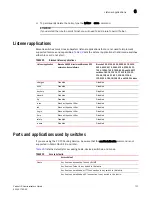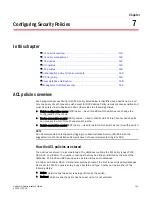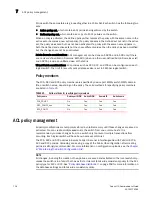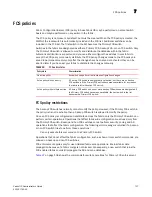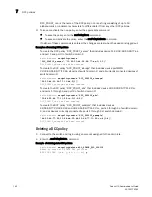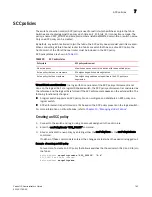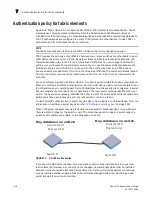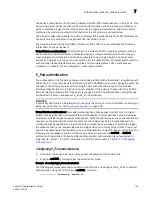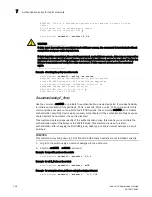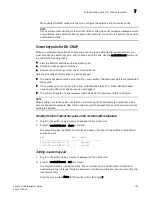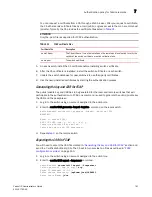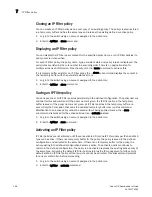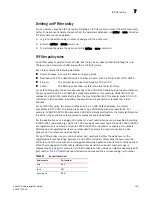
140
Fabric OS Administrator’s Guide
53-1001763-02
DCC policies
7
Only the Primary FCS switch is allowed to distribute the database. The FCS policy may need to be
manually distributed across the fabric using the distribute -p command. Since this policy is
distributed manually, the command fddCfg
–-
fabwideset is used to distribute a fabric-wide
consistency policy for FCS policy in an environment consisting of only Fabric OS v6.2.0 and later
switches.
FCS enforcement for the distribute command is handled differently for FCS and other databases in
an FCS fabric:
•
For an FCS database, the enforcement allows any switch to initiate the distribution. This is to
support FCS policy creation specifying a remote switch as Primary.
•
For other database distributions, only the Primary FCS switch can initiate the distribution.
The FCS policy distribution is allowed to be distributed from a switch in the FCS list. However, if
none of the FCS switches in the existing FCS list are reachable, receiving switches accept
distribution from any switch in the fabric. To learn more about how to distribute policies, refer to
“ACL policy distribution to other switches”
on page 160.
Local switch configuration parameters are needed to control whether a switch accepts or rejects
distributions of FCS policy and whether the switch is allowed to initiate distribution of an FCS policy.
A configuration parameter controls whether the distribution of the policy is accepted or rejected on
the local switch. Setting the configuration parameter to accept indicates distribution of the policy
will be accepted and distribution may be initiated using the distribute -p
command. Setting the
configuration parameter to reject indicates the policy distribution is rejected and the switch may
not distribute the policy.
The default value for the distribution configuration parameter is
accept,
which means the switch
accepts all database distributions and is able to initiate a distribute operation for all databases.
DCC policies
Multiple DCC policies can be used to restrict which device ports can connect to which switch ports.
The devices can be initiators, targets, or intermediate devices such as SCSI routers and loop hubs.
By default, all device ports are allowed to connect to all switch ports; no DCC policies exist until
they are created. For information regarding DCC policies and F_Port trunking, refer to the
Access
Gateway Administrator’s Guide
.
Each device port can be bound to one or more switch ports; the same device ports and switch
ports may be listed in multiple DCC policies. After a switch port is specified in a DCC policy, it
permits connections only from designated device ports. Device ports that are not specified in any
DCC policies are allowed to connect only to switch ports that are not specified in any DCC policies.
When a DCC violation occurs, the related port is automatically disabled and must be re-enabled
using the portEnable command.
Table 29
on page 141 shows the possible DCC policy states.
TABLE 28
Distribution policy states
Fabric OS
State
v6.2.0 and later configured to
accept
Target switch accepts distribution and fabric state change occurs.
v6.2.0 and later configured to
reject
Target switch explicitly rejects the distribution and the operation fails. The
entire transaction is aborted and no fabric state change occurs.
Summary of Contents for 53-1001763-02
Page 1: ...53 1001763 02 13 September 2010 Fabric OS Administrator s Guide Supporting Fabric OS v6 4 0 ...
Page 4: ...iv Fabric OS Administrator s Guide 53 1001763 02 ...
Page 24: ...xxiv Fabric OS Administrator s Guide 53 1001763 02 ...
Page 28: ...xxviii Fabric OS Administrator s Guide 53 1001763 02 ...
Page 32: ...xxxii Fabric OS Administrator s Guide 53 1001763 02 ...
Page 40: ...xl Fabric OS Administrator s Guide 53 1001763 02 ...
Page 42: ...2 Fabric OS Administrator s Guide 53 1001763 02 ...
Page 54: ...14 Fabric OS Administrator s Guide 53 1001763 02 High availability of daemon processes 1 ...
Page 74: ...34 Fabric OS Administrator s Guide 53 1001763 02 Basic connections 2 ...
Page 102: ...62 Fabric OS Administrator s Guide 53 1001763 02 Audit log configuration 3 ...
Page 214: ...174 Fabric OS Administrator s Guide 53 1001763 02 Management interface security 7 ...
Page 228: ...188 Fabric OS Administrator s Guide 53 1001763 02 Brocade configuration form 8 ...
Page 276: ...236 Fabric OS Administrator s Guide 53 1001763 02 Creating a logical fabric using XISLs 10 ...
Page 404: ...364 Fabric OS Administrator s Guide 53 1001763 02 ...
Page 440: ...400 Fabric OS Administrator s Guide 53 1001763 02 Performance data collection 17 ...
Page 480: ...440 Fabric OS Administrator s Guide 53 1001763 02 F_Port masterless trunking 19 ...
Page 494: ...454 Fabric OS Administrator s Guide 53 1001763 02 Buffer credit recovery 20 ...
Page 574: ...534 Fabric OS Administrator s Guide 53 1001763 02 Hexadecimal overview E ...






